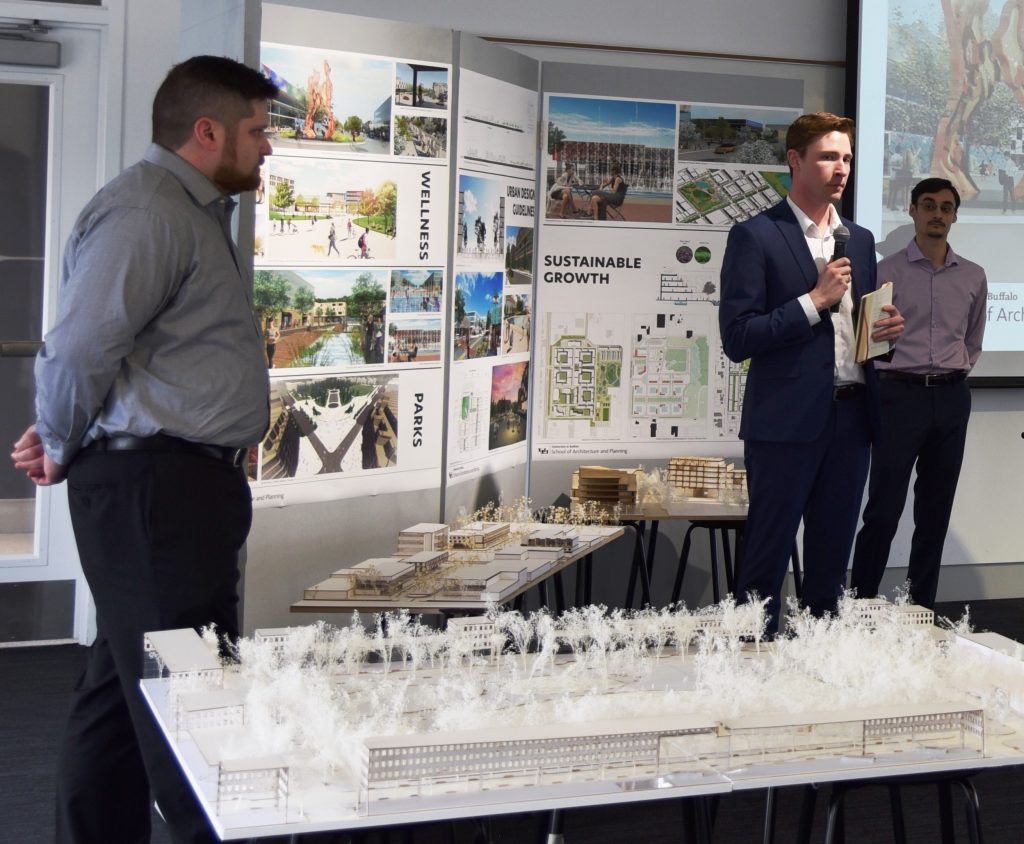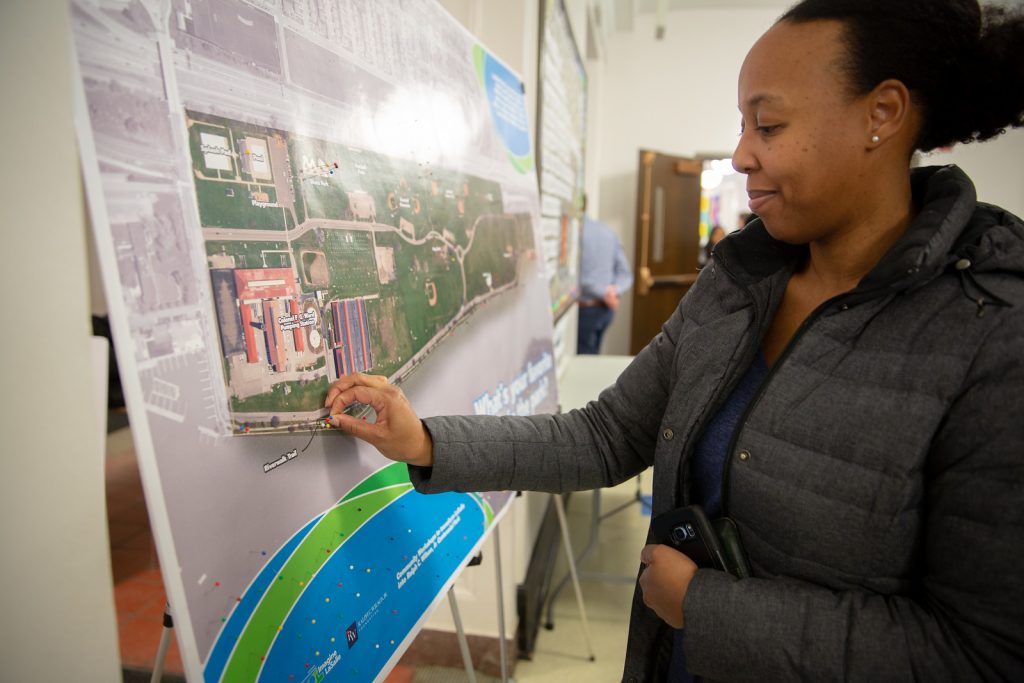The Impact of Our Collaborations: 2015-2020
Partnerships between the school and UBRI bring immeasurable impacts to students, faculty, UBRI staff, and most importantly, the community we work in. Although hard to measure, these benefits are evident in a number of ways as described below and summarized in our Community Impact Report.

Students who became involved in important local planning projects through UBRI, serving as volunteers and student
research assistants, enhancing the educational experience.

Faculty members engaged in practical research through UBRI work, the research opportunities these collaborations offer, and
publications developed from this research.

Enhanced value of UBRI’s planning work with strategic partners that comes from the knowledge, dedication, and creativity of students and faculty who partner with UBRI.

Added community benefits that come from applied community-based research focused on meaningful participatory engagement.
Growing Food Connections
Faculty: Samina Raja, Ph.D.
Research Entity: Food Systems Planning and Healthy Communities Lab
Local governments can engage in food systems planning to identify and understand the various food production and food security challenges and opportunities in their communities and develop public policy tools to better connect underserved residents with those who produce food within their communities. Working in all regions of the US, and across rural and urban places, the Growing Food Connections partnership (a diverse group of researchers, extension and planning practitioners and food systems stakeholders) uses an integrated approach to build the capacity of local governments to deploy these public policy tools, generate knowledge, and nurture future educators and scholars.
Growing Food Connections is made possible with a grant from the USDA National Institute of Food and Agriculture, Agriculture and Food Research Initiative Competitive Grant no. 2012-68004-19894. The project is guided by a National Advisory Committee with representation from diverse disciplines, regions and backgrounds.
The Growing Food Connections team’s work is continually shared through academic research and policy-friendly publications that translate research in a way that is useful for planning and policy audiences. UBRI made contributions to the research, design, visual communications and production of the Growing Food Connections website, including the Local Government Policy Database, and the following publications:
Journal Articles and Book Chapters
- Raja, Samina, Subhashni Raj and Bartholomew Roberts. 2017. “The US Experience in Planning for Community Food Systems: An Era of Advocacy, Awareness, and (Some) Learning.” In Nourishing Communities: From Fractured Food Systems to Transformative Pathways, edited by Irena Knezevic, Alison Blay-Palmer, Charles Z. Levkoe, Phil Mount and Erin Nelson. Toronto, ON: Springer International Publishing. Pages 59-74.
Policy Briefs
- Entress, Sharon, Alexandra Judelsohn, Brenda Stynes and Samina Raja. 2018. “Refugees and Food Experiences: New Research from Buffalo, NY.” In Translating Research for Policy Series, edited by Samina Raja. Buffalo: Growing Food Connections Project.
- Hall, Enjoli and Samina Raja. 2018. “Seeding Food Justice: Community-Led Practices for Local Government Policy in Dougherty County, Georgia.” In Exploring Stories of Opportunity Series, edited by Samina Raja. Buffalo: Growing Food Connections Project.
- Hall, Enjoli and Samina Raja. 2018. “Towards Health Equity in the Heartland: Advancing Community-Led Food Planning in Douglas County, Nebraska.” In Exploring Stories of Opportunity Series, edited by Samina Raja. Buffalo: Growing Food Connections Project.
- Whittaker, Jennifer and Samina Raja. 2015. “How Food Policy Emerges: Research Suggests Community-Led Practice Shapes Policy.” In Translating Research for Policy Series, edited by Samina Raja and Jeanne Leccese. Buffalo: Growing Food Connections Project.
Forums, Symposia and Conferences
- Planning for Food Systems in Urban Settlements: Lessons and Challenges from North America. UN Conference on Housing and Sustainable Urban Development, Quito, Ecuador. October 2016.
Planning and Designing a Compact, Eco-Friendly Suburb of Seoul, South Korea
Faculty: Jin Young Song
Jin Young Song led a team of architecture and planning students in a studio project that generated a plan for sustainable development in Yangpyeong, South Korea—a suburb of Seoul and a burgeoning tourist destination due to its pristine nature and bucolic scenery. The team was advised by Brian Conley from UBRI who assisted in the application of sustainable planning strategies, and modeling of environmental impacts of proposed developments.
Working alongside Yangpyeong-based Minimax Architects, civil engineers and faculty of Yonsei University, Song and his students spent the semester generating master planning strategies and architectural designs for compact and sustainable development. The studio focused its research around three strategically located sites in the city, proposing a series of ecologically-sensitive residential and mixed-used developments with integrated greenspace.
This project was funded by the Yangpyeong county government.
Coursework
- ARC 608-3 – Graduate Option Studio – Yangpyeong + Seoul Studio Instructor: Jin Young Song – Spring 2015
Professional Reports and Plans
- MINIMAX Architects and Yangpyeong Seoul Studio. 2015. Yangpyeong: Compact Renaissance. Buffalo, NY: University at Buffalo, School of Architecture and Planning.
Faculty Research Informs One Region Forward
How Food Systems Planning informs One Region Forward’s work
Faculty: Samina Raja, Ph.D., Himanshu Grover, Ph.D.
UBRI collaborated with UB faculty on two technical strategy documents completed as part of One Region Forward. A climate change strategy document provides a broad policy framework for responding to the existing and anticipated impacts of climatic change already underway across the Buffalo-Niagara region; and a food access and justice strategy document charts a course for promoting agricultural viability and improving food access in the Buffalo Niagara region.
One Region Forward was initiated from a grant of the US Department of Housing and Urban Development through its Partnership for Sustainable Communities, an interagency collaboration also involving the US Department of Transportation and the Environmental Protection Agency. Additional support was provided through grant #1105024-1-62098 from the National Institute of Food and Agriculture (NIFA) of the United States Department of Agriculture to Samina Raja (PI).
Professional Reports and Plans
- Raja, Samina, Jessica Hall, Travis Norton, Patrick Gooch, Subhashni Raj, Taylor Hawes, and Jennifer Whittaker. 2014. Growing Together: Ensuring Healthy Food, Strong Farms, and a Prosperous Buffalo Niagara.Buffalo, NY: University at Buffalo Regional Institute and the Food Systems Planning and Healthy Communities Lab, University at Buffalo, School of Architecture and Planning.
- Grover, Himanshu, Margaret Smith, Yanjia Cao and Yi Yang. 2014. Resilient Buffalo Niagara: Strategies to Respond to Climate Change. Buffalo, NY: University at Buffalo Regional Institute, University at Buffalo, School of Architecture and Planning.
Connections Beyond Campus
Faculty: Daniel B. Hess, PhD,
Dr. Hess partnered with UBRI on research to evaluate the Niagara Frontier Transportation Authority-University at Buffalo (NFTA-UB) Transit Pass Program which provided students, faculty, and staff of the University at Buffalo with pre-paid unlimited rides between 2011 and 2012 on Metro Rail (operated by the Niagara Frontier Transportation Authority). The evaluation is intended to assist stakeholders in understanding the costs and benefits of the transit pass program and to further sustainability goals at the University at Buffalo, throughout the region, and beyond. Findings are intended to be useful for better understanding how pre-paid transit passes can influence travel behavior decisions and re-align financing of urban transportation systems.
This research project was sponsored by the Research and Innovative Technology Administration / USDOT (RITA) through the University Transportation Research Center (UTRC) – Region 2.
Professional Reports and Plans
- Hess, Daniel Baldwin, Paul David Ray, and Nathan Attard. 2014. Connections Beyond Campus: An Evaluation of the Niagara Frontier Transportation Authority-University at Buffalo Pilot Transit Pass Program. University Transportation Research Center, Region II. The City College of New York.
Adapting Buildings for a Changing Climate
Faculty: Nicholas Rajkovich, Ph.D.
Research Entity: Resilient Buildings Lab
The School of Architecture and Planning’s Resilient Buildings Lab is at the helm of new research on how buildings in New York State will need to adapt to the changing climate, an issue brought to the forefront by Hurricane Sandy in 2012 and “Snowvember,” the seven-foot lake effect snow event that hit parts of Buffalo in 2014. Led by Nicholas Rajkovich and his UB research team, which included UBRI, the three-year project assessed climate change impacts and proposed adaptive strategies for the state’s building stock.
The project resulted in a series of three reports and a Climate Adaptation Symposium to help New York’s policymakers, architects, builders, building owners and managers, and residents understand the impacts climate change has on the State’s building sector. The project examines how climate change impacts New York’s buildings by region and building type; the potential economic costs of those impacts; and the most promising strategies for climate-resilient buildings in New York State – the first in the nation to examine the impact and role of buildings in adapting to climate change.
The project is made possible by New York State Energy Research and Development Authority (NYSERDA).
Professional Reports and Plans
- Ray, Paul, Nicholas B. Rajkovich, Michael E. Tuzzo, Martha Bohm, and Bart Roberts. 2018. Regional Costs of Climate Related Hazards for the New York State Building Sector. New York State Energy Research and Development Authority (NYSERDA), Albany, New York.
University Heights
Faculty: Erkin Ozay, Greg Delaney, Hiro Hata, Mark Foerster, Ashima Krishna, Ph.D.
The UB School of Architecture and Planning is taking an intentional approach to study its campus home and the surrounding University Heights neighborhood over a continuous, multi-year engagement. Through the 2017 calendar year University Heights became a living laboratory as faculty and students explored specific issues in the community – through the lenses of urban planning and architecture.
UBRI completed a baseline assessment of the University Heights neighborhood that frames the neighborhood in data and past and ongoing planning work. This included a qualitative assessment of 29 recent planning documents that yielded seven key planning themes; and a quantitative assessment about neighborhood demographics, economic trends, land uses, real estate market, crime patterns, and more that helps frame the neighborhood’s key strengths and challenges. Students, faculty, and UBRI worked hands-on in the University Heights neighborhood through two master’s level studio courses, a graduate-level urban design seminar, and several undergraduate and graduate level course projects looking at key sites and issues, to identify potential design and planning solutions.
Coursework
- ARC 606 – Articulating the Edge: Imaging the Futures of the University Heights (architectural interventions to advance community/campus priorities) Instructor: Erkin Ozay – Spring 2017
- ARC 589 – Urban Design – Town & Gown (campus and connection to place) Instructor: Greg Delaney – Spring 2017
- ARC – URP 565 – Understanding Good Urban Form (design solutions for Bailey Avenue) Instructor: Hiro Hata – Fall 2017
- ARC 607-2 / ARC 609– Option Studio – Urban Design (transit-oriented development around University Station) Instructors: Mark Foerster and Hiro Hata – Fall 2017
- URP 529– Documentation and Field Methods in Historic Presentation (historic preservation in University Heights) Instructor: Dr. Ashima Krishna – Fall 2016
Professional Reports and Plans
- Exploring the University Heights: The University Heights and UB School of Architecture and Planning. Buffalo, NY: University of Buffalo, School of Architecture and Planning.
Economic Development Planning
As leading economic development researchers, working in partnership with economic development practitioners throughout the region and beyond, a UBRI team, led by Laura Quebral, instruct a Master’s level seminar offered in the spring semester by the School of Architecture and Planning. The course introduces students to the diverse ideas, roles and impact of policies in the practice of economic development planning through practical examples drawn primarily from New York State and the Western NY region. The course explores the complex ecosystem of economic development decision making: how regional economies operate, how informed decisions are made and evaluated, strategies and tools for improving the economy, the role of different organizations in a market-driven economy, and overarching themes of equity and sustainability in economic development planning.
Coursework
- END 422/URP 522– Economic Development Planning Instructor: Laura Quebral and Brian Conley- Spring 2018, Spring 2019
Affordable Housing
Faculty: Stephanie Cramer, Mark Foerster, Edward Steinfeld, Ph.D.
The School of Architecture and Planning is convening leading scholars and practitioners across the planning, architecture and real estate development professions to explore current conditions and future trends in housing policy, design and finance, and to consider new models for high-quality, affordable housing. Ultimately, through coursework, research and participation in studios, architecture, real estate development and urban planning students and faculty will plan, design and build single-family or multi-family affordable housing prototypes for underserved neighborhoods in Buffalo. Prototypes will be replicable both for Buffalo and cities like it across the U.S. The design-build project will also consider innovative design and construction materials and techniques. UBRI is assisting with the research, program design and communications for this initiative.
The School of Architecture and Planning launched this initiative through the essential financial support from alumni, friends and the UB President’s Circle.
Forums, Symposia and Conferences
- UB Affordable Housing Symposium, April 10, 2018, UB South Campus
- Professional Reports and Plans Affordable Housing Initiative. Buffalo, NY: University of Buffalo, School of Architecture and Planning.
Conversion of Historic Churches in Buffalo
Faculty: Ashima Krishna, PhD
Enjoli Hall assisted with this research that examines how in shrinking cities, particularly those now welcoming new immigrants and refugees, serendipitous conservation of vacant churches through faith-to-faith conversion can be an asset to local planners and preservationists in their fight to save urban heritage from demolition.
Forums, Symposia and Conferences
- Krishna, Ashima and Enjoli Hall. 2018. “Serendipitous Conservation: Faith-to-Faith Conversion of Historic Churches in Buffalo.” Paper presented at the 58th Annual Conference of the Association of Collegiate Schools of Planning (ACSP). Buffalo, NY. October 25, 2018.
Smart and Connected Communities
Faculty: Zoe Hamstead, Ph.D., Nicholas Rajkovich, Ph.D.
A team of researchers from the University at Buffalo and Arizona State University examined the different ways in which extreme heat and cold impact the nation’s cities. This research project examined existing practices related to the management of heat and cold in several cities, including Buffalo, New York, and Tempe, Arizona—two regions that have gained national headlines in recent years for their severe weather. The project involved assessment of community partner practices, goals, and needs in these two cities with an emphasis on learning how partners use and seek data related to weather, health, energy, transit, and other relevant factors. The project team aimed to design a strategy for building resilience to thermal extremes that links technology and society.
UBRI provided support for this project including facilitation at forums held in both cities to learn how practitioners are managing extreme weather.
This project was made possible by the National Science Foundation, Division of Computer and Network Systems, Smart and Connected Communities Planning Grant.
Forums, Symposia and Conferences
- Smart & Connected Communities Tempe Forum, Arizona State University, March 2-4,
- Smart & Connected Communities Buffalo Forum, University at Buffalo, June 29, 2018
Community Solar
Faculty: Zoe Hamstead, Ph.D.
Research Entity: Resilient Buildings Lab
In this urban planning studio, students worked with community partners to advance renewable energy solutions along the Northland Corridor on Buffalo’s East Side. While exploring the benefits of solar energy, the studio detailed the processes of community engagement and provided recommendations for how residents may be able to move a community solar project forward. Jason Kulaszewski offered guidance to the studio—advising on community solar as a concept and how projects are developed.
Student Reports and Plans
- Community Solar Studio. 2018. Community Solar Conversations: Exploring the Potential for Renewable, Affordable Energy. Buffalo, NY: University at Buffalo, School of Architecture and Planning.
Delta Mountains: 3D Representations of Transit Access in Buffalo Niagara
Faculty: Joshua Stein, Woodbury University
Visiting scholar to UB’s School of Architecture & Planning through UB’s Creative Arts Initiative’s Artist-In-Residence program.
Joshua Stein, Principal of Radical Craft and Professor of Architecture at Woodbury University collaborated with a number of UB departments on “Delta Mountains,” a project that aims to compare the accessibility of Buffalo’s historic streetcar system to that of the current transit network. This culminated in a series of 2D mappings as well as a large ceramic sculpture, “Isochronic Mountain Buffalo,” that gives a 3D representation of travel times by transit throughout the greater Buffalo area. To uncover transit accessibility in both the historic and contemporary networks, Stein engaged UBRI’s Brian Conley to create the geospatial data underlying his material structures. Conley applied GIS tools and researched historical maps to model the travel times to Buffalo City Hall via the region’s current transit network and Buffalo’s pre-war streetcar system. The ceramic structures, maps, and other artifacts that Stein produced through “Delta Mountains” will be displayed at the Observation Deck at Buffalo City Hall in 2019.
Associated Faculty
We connect with faculty on projects that could benefit from a particular skill-set, expertise or burgeoning research in a particular field. Our collaborative projects with the UB School of Architecture and Planning faculty span topics as diverse as food-system security, responses to climate change, green transportation systems, inclusive design, situated technologies (the use of technology embedded in buildings), sustainable community development, planning for extreme events (such as earthquakes or hurricanes) and many others.
Lynda Schneekloth
School of Architecture and Planning
View Professional Profile
Nicholas B. Rajkovich
School of Architecture and Planning
View Professional Profile
Hiroaki Hata
School of Architecture and Planning
View Professional Profile
Daniel B. Hess
School of Architecture and Planning
View Professional Profile
Samina Raja
School of Architecture and Planning
View Professional Profile
